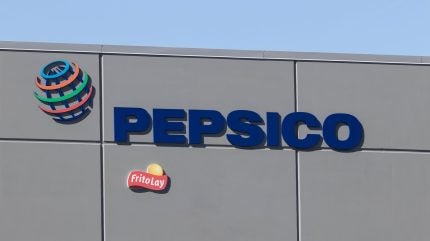
PepsiCo has pushed out its target for net-zero emissions by a decade amid “external realities”.
The US food and drinks giant is now aiming to hit net-zero emissions “by 2050 or sooner” compared to its previous goal of 2040 “versus a 2015 baseline”.

Discover B2B Marketing That Performs
Combine business intelligence and editorial excellence to reach engaged professionals across 36 leading media platforms.
PepsiCo has also made changes to specific goals on emissions and on packaging while “expanding” its target on regenerative agriculture.
The Pepsi Max and Lay’s maker is the latest major FMCG company to revise ESG goals, the changes coming in the wake of similar moves from The Coca-Cola Company and Unilever in the last 12 months.
In a statement yesterday (22 May), PepsiCo said it was “strengthening the resilience of its business and honing its focus to where it believes it can have the most positive impact”.
It added: “The company is remaining ambitious with its sustainability targets – and in the case of regenerative agriculture, setting an even more ambitious target – evolving with the latest science, and being pragmatic about where efforts have been limited by external factors and systemic barriers, such as lagging infrastructure and the growth of the business.”

US Tariffs are shifting - will you react or anticipate?
Don’t let policy changes catch you off guard. Stay proactive with real-time data and expert analysis.
By GlobalDataPepsiCo chief sustainability officer Jim Andrew added: “We know it’s important that we continue to be transparent about our progress – both our successes and the challenges – and the dynamic realities that our company and the broader industry face today.
“Our sustainability journey will not always be linear, but we are focused on doing the work that can both strengthen our business resilience and support a positive impact for the planet.”
PepsiCo’s specific targets on Scope 1, 2, and 3 emissions link to its 2050 target. The company said the goals “reflect sectoral guidance” from The Science Based Targets initiative.
The Quaker Oats cereals owner is looking to cut its Scope 1 and 2 emissions by 50% by 2030 versus a 2022 baseline. PepsiCo had been targeting a 75% reduction by the same year against a 2015 baseline.
On Scope 3 emissions, often the hardest for companies to tackle, PepsiCo has set out two types related to SBTi guidance: Energy and Industry (E&I); and Forests, Land and Agriculture (FLAG).
The group is aiming for a 42% decrease in E&I emissions by 2030 compared to 2022 levels, a goal that compares to a previous target of a 40% reduction by 2030 against a 2015 baseline.
PepsiCo’s goal for FLAG emissions also includes a new baseline. The company has a goal of reducing these emissions by 30% by 2030 when measured to a 2022 baseline. Its previous target was a 40% cut by 2030 versus 2015.
On packaging, the Gatorade and Walkers owner announced changes on reducing virgin plastic and recycled content. It also pulled its target for “reusable” packaging.
PepsiCo is aiming to cut its use of virgin plastic by 2% year-on-year on average through to 2030. The company’s previous target was for a 20% decrease “derived from non-renewable sources” by the same year.
The group’s goal for its use of recycled content stands at a reduction of at least 40% “by 2035 or sooner”. It had been targeting using 50% of recycled content by 2030.
PepsiCo had been looking to “deliver 20% of all beverage servings through reusable models by 2030”, a target that no longer exists.
The company said it will focus on a wider goal for reusable, recyclable, or compostable (RRC) packaging by design. By 2030, PepsiCo is aiming for at least 97% of its packaging to be “RRC packaging by design … in our primary and secondary packaging in our key packaging markets”.
Matt Littlejohn, strategic initiatives senior vice-president at ocean-conservation organisation Oceana, said: “By killing its reuse goal, and other goals that would actually reduce plastic packaging, Pepsi is hurting our oceans and the environment. The best way for Pepsi to reduce plastic pollution is not by abandoning goals but by dramatically increasing the use of refillable bottles – which can be used up to 50 times if made of glass.”
PepsiCo has broadened its goal for regenerative agriculture goal and said it is aiming for ten million acres by 2030, up from a previous target of seven million acres.
The company said it had “already delivered approximately 3.5 million acres”.
PepsiCo chairman and CEO Ramon Laguarta said: “Our goals must evolve with us to keep our ambition and to deliver on our long-term vision.”





